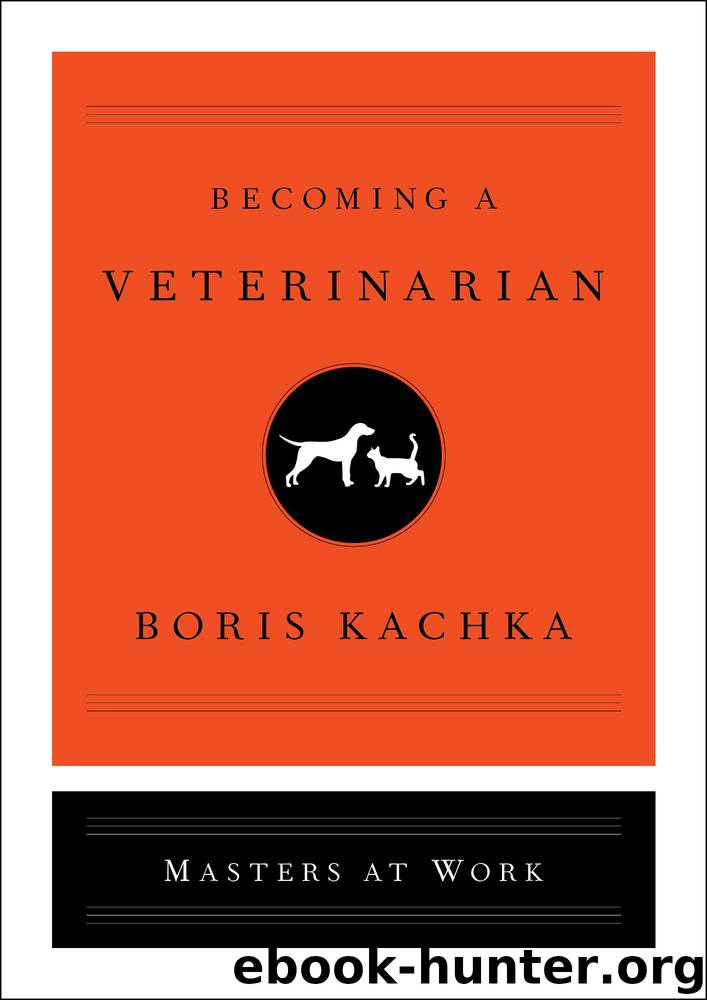Becoming a Veterinarian by Boris Kachka

Author:Boris Kachka
Language: eng
Format: epub
Publisher: Simon & Schuster
5
* * *
THE SPECIALISTS, PART ONE: CRITICAL CASES
The ASPCA’s expansion is making Lund feel, once again, overextended. Unsure of his future as a manager, he anticipates another bend in the road—not a burnout, but a change—and has been preparing accordingly. In 2016 he applied to nine programs for a residency in pathology, without success. So now, in 2017, “I’m back to the drawing board.”
Lund’s growing interest in pathology—the study of not only individual causes of death but also epidemics—is in part a consequence of his shelter work, a ground-level crash course in stemming the spread of disease. But it also connects him to that first passion of so many idealistic vets: wildlife medicine. After volunteering at the Bronx Zoo, Lund was keen on their joint pathology residency with Cornell’s wildlife center. But he was competing with both star interns and applicants with years of published research under their belts. “Was I the best candidate?” he asks. “Absolutely not.” (He’s probably being a little hard on himself; the year he applied, there were three applicants for every residency position in the country. That’s why so many specialists wind up doing a second internship.)
Residencies can be a gamble—high-risk (at low pay) for high-reward. “The sky’s the limit with some positions,” says Lund, “but you need to be the best and the brightest and know people to get those positions.” Still, it’s a way forward. “I don’t see a twenty-year trajectory here,” he says of his current job. “I see a couple years to learn something and then get on to the next thing.”
More and more vets are getting on to the next thing. The number of board-certified specialists—in fields ranging from oncology to dermatology but especially in critical care, surgery, and internal medicine—has risen steadily in recent years. There are 8 percent more board-certified specialists than just three years ago, outpacing the total increase in vets by 35 percent. And compared to five years ago, 48 percent more AVMA members today report working in referral or specialty medicine.
The trend toward specialization runs in tandem with another; vet care is becoming more and more like human medicine. Less than one-third of MDs work in general practice, and that makes sense to us, even though they already specialize in only one species. They don’t have to treat a rat, a chicken, a rabbit, and a dog on the same day. There’s less demand for referral animal health care for the simple reason that fewer people are willing to spend money on it, but more and more vets are choosing to test that status quo.
One reason vets do decide to specialize—especially the many who try general practice first—is the desire to trade breadth for depth. “I would rather know a lot about a little,” says Jesse Terry. In 2016 he completed a residency in surgery, becoming the fourth vet surgeon in Utah.
As in human medicine, there’s a specialty for every veterinary personality. Surgeons tend to be confident, comfortable with giving orders and making high-stakes decisions. The worriers and studiers go for internal medicine.
Download
This site does not store any files on its server. We only index and link to content provided by other sites. Please contact the content providers to delete copyright contents if any and email us, we'll remove relevant links or contents immediately.
| Business School Guides | GMAT |
| Guides | Interviewing |
| Job Hunting | Job Markets & Advice |
| Resumes | Vocational Guidance |
| Volunteer Work |
The Motivation Myth by Jeff Haden(4545)
Audition by Ryu Murakami(4117)
Adulting by Kelly Williams Brown(3691)
The Confidence Code by Katty Kay(3582)
Waiting in the Wings by Melissa Brayden(2820)
A Mind For Numbers: How to Excel at Math and Science (Even If You Flunked Algebra) by Barbara Oakley(2699)
Self-Esteem by Matthew McKay & Patrick Fanning(2612)
Nice Girls Don't Get the Corner Office by Lois P. Frankel(2603)
The ONE Thing by Gary Keller(2538)
The Dictionary of Body Language by Joe Navarro(2443)
Fooled by Randomness: The Hidden Role of Chance in Life and in the Markets by Nassim Nicholas Taleb(2428)
How to be More Interesting by Edward De Bono(2367)
Getting Things Done by David Allen(2328)
Designing Your Life by Bill Burnett(2289)
The Plant Paradox by Dr. Steven R. Gundry M.D(2055)
Police Exams Prep 2018-2019 by Kaplan Test Prep(2043)
What Color Is Your Parachute? 2015 by Richard N. Bolles(1934)
Dangerous Personalities by Joe Navarro(1900)
When to Jump by Mike Lewis(1814)
